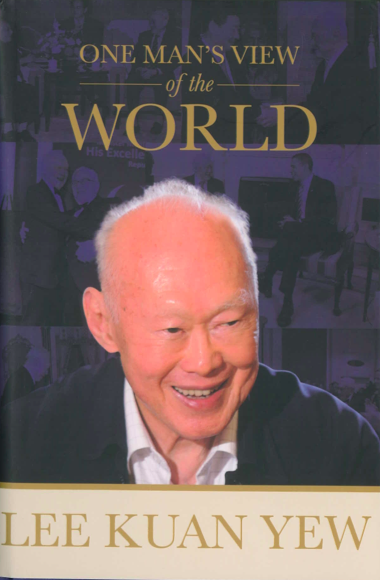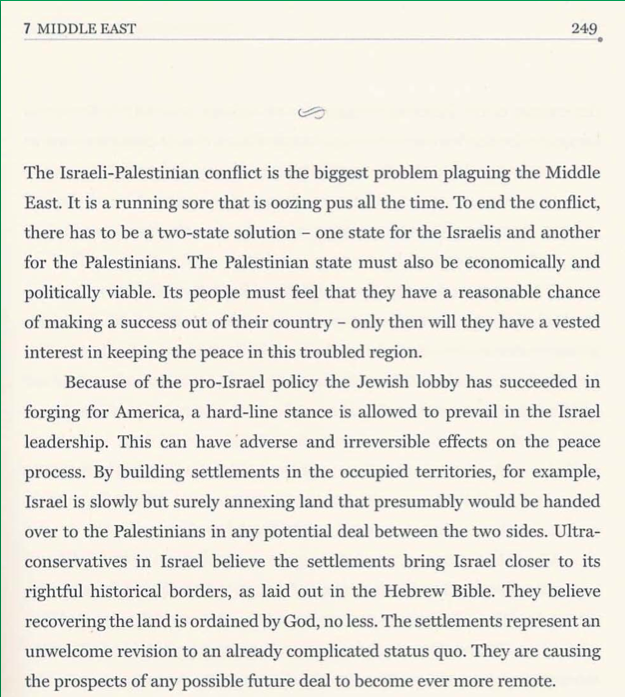
29 Mar, 2016
Lee Kuan Yew’s formula for tackling the “cancer” of global terrorism
The first death anniversary of former Singaporean Prime Minister Lee Kuan Yew on March 23 was a good opportunity to visit the island nation. This micro-country has compensated for its lack of natural resources by growing its people resources, creating one of the world’s best-run, least-corrupt societies with an uncompromising focus on multi-culturalism and rule of law. LKY, as he is popularly known in Singapore, is widely credited as the architect of this remarkable achievement.
Memorials and tributes to the late visionary leader were omnipresent. The Straits Times ran an 11-page section recollecting his achievements. The National Museum devoted an entire gallery to his life and times. Bookstores were full of publications hailing his role in the rise of Singapore and indeed the ASEAN and Asia-Pacific regions.
The most eye-catching book, “One Man’s View of the World,” stood out from the others because it was an autobiography, written in Mr. Lee’s own words, with a specific focus on international affairs. The marketing pitch on the cover flap says, “Lee draws on that wealth of experience and depth of insight to offer his views on today’s world and what it might look like in 20 years.” The book “is no dry geopolitical treatise” and contains “unflinching prose that eschews political correctness” with “candid and often startling views.”
 |
Actually published in 2013, two years before Mr. Lee’s death, the book discusses everything from the rise of China, the shifting balance of power, the decline of America, the issues facing ASEAN and the perils of the Indian caste system. It is backed by applauding comments by former U.S. President George H.W.Bush, former Japanese PM Yasuhiro Nakasone, former German Chancellor Helmut Schmidt and many other distinguished world leaders, past and present.
Perhaps his most “candid and startling views” which truly “eschew political correctness” are devoted to the Israeli-Palestinian conflict and its impact on the Middle East and global geopolitics.
Using colourful medical terminology, he describes the conflict as a “running sore that is oozing pus all the time” and a “cancer in the international system.” In just under 1,150 words, he criticises the Jewish lobby (yes, he specifically and unequivocally calls it the “Jewish lobby”, not the Israeli lobby) for preventing the emergence of a Palestinian state. Putting the blame entirely on Israel and its American backers, he offers a simple solution: “If, for example, the Americans are willing to cut off financial aid to Israel – amounting to US$115 billion since 1949 – as well as other forms of military and political support until the building of settlements stops, Israel will have no choice but to act.”
Highlighting the linkage between the continuation of the conflict, global peace and terrorism, Mr. Lee says, “The Israeli-Palestinian conflict is at the centre of a complicated web of violence and unrest in the Middle East. It is like a cancer in the international system which, if removed, would pave the way for the resolution of many other problems.”

As events of the past few years have shown, Mr. Lee has been proved right. Given the close inter-linkages between global conflict, geopolitical instability and travel/tourism, Mr. Lee’s comments provide the travel & tourism industry with food for thought about how to deal with the “cancer” of global terrorism in the years ahead. They also pave the way for a broader and more holistic look at peace and conflict issues, for a more equitable sharing of the blame, and closer scrutiny of the Jewish lobby in the perpetuation of the Israeli-Palestinian conflict.
Indeed, one has to marvel at Mr. Lee’s foresight and courageous choice of words.
On the same day as I was perusing this and other books on Mr. Lee, terrorism in Europe was hitting new highs, even as American presidential candidates were queuing up at the annual convention of the American-Israel Public Affairs Committee (AIPAC, the apex body of the U.S. Jewish lobby) to reaffirm their loyalty and allegiance to Israel.
The comments are even more relevant in the broader context of Mr. Lee’s nation-building challenge. Singapore emerged as an independent, sovereign state from the ashes of British colonisation of the Malay peninsula and the potential socio-ethnic complications of cultural diversity. As cited several times in the book, Mr. Lee, a trained lawyer, knew that Singapore would fail without a stringent rule of law and inclusive integration amongst the Chinese, Malays and Tamils. The British had bequeathed English as a unifying factor and laid the foundations of its commercial development as a maritime trading hub. These assets could only be harnessed if internal peace prevailed, which meant rule of law and multi-culturalism.
As the architect of an independent, multi-cultural, rule-of-law nation, Mr. Lee clearly sympathises with the Palestinian right to follow suit. He dismisses the supposed European sympathy for the Palestinians. Asked “Is it of consequence that European sympathy for the Palestinians is growing?” Mr. Lee responds: “What is sympathy worth? Every day, land is taken away from you. What is the sympathy doing about it?”
That comment bared the global double-standards and hypocrisy which contradict all rule-of-law principles and worsen the cancer. Although the book was published when Mr. Lee was alive, not a single Western media outlet reported on his criticism of the Jewish lobby. Nor did Mr. Lee come under fire for anti-Semitism or incitement, unlike the barrage of criticism that rained down on former Malaysian Prime Minister Mahathir Mohammed following his speech at an Islamic Summit in October 2003.
It also proves why Israel is caught in a lose-lose trap. In the Israel-Palestinian conflict, might is right. Israel is backed by Big Brother, the United States, and the power of its Jewish-owned multinational conglomerates. The Israelis are now moving into Asia and seeking to build “shared-values” alliances with India and some of the ASEAN countries. But the truth is emerging, and the efforts of the Jewish lobby to silence global criticism are failing.
I am a direct victim of this silencing campaign. Mr. Lee’s comments in his autobiography vindicated me personally and professionally, and strengthened my ongoing efforts to champion the cause of an independent Palestinian state. Mr. Lee had made the same comments about the Jewish lobby at an annual conference of the International Air Transport Association in Kuala Lumpur in June 2009. I was the world’s only journalist to report his remarks in a now-defunct column in the Bangkok Post (which can be read here). Mr. Lee came away unscathed but I paid the price of upsetting the Jewish lobby and its formidable army of supporters in Thailand, especially amongst the American, British, Australian and European expatriates.
In July 2012, the column was gagged by the Bangkok Post, which claims to be the “Newspaper You Can Trust”. In the light of Mr. Lee’s comments, I stand exonerated.



Liked this article? Share it!